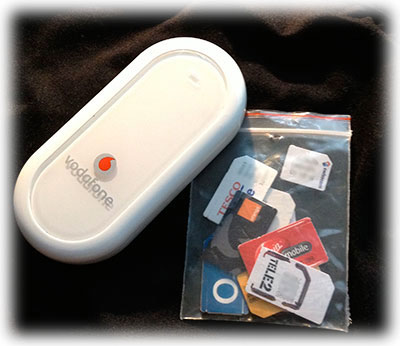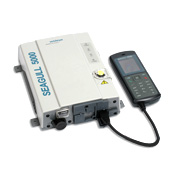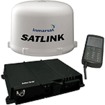If you get withdrawal symptoms without the Internet,
You can avoid going cold turkey ’til the next WiFi hotspot.

You may well be one of those people who goes sailing to get away from it all for a while. You may regard being out of contact as part of the charm.
Sorry, I’m not one of you.
I love sailing but I love my life too and have come to regard my smart-phone, my tablet and my laptop almost as extensions of my body. The loss of Google, text and email are an intolerable privation somewhat akin to waking up in a chastity belt with no sign of the key-holder.
Civilised sailing
I’d love to cross an ocean some day, but day-sailing a passage is where I’m happiest. Being out on the water is as much part of the fun as a hot shower and cold beer somewhere new at the end of the day.
Withdrawal can kick in at any time though. Those charming, secluded anchorages away from the madding crowd are an awesome way of spending an evening peacefully enjoying a bottle of wine and the last of the sun. But if there’s mobile coverage at all, why does it never seem to be my network?
And when sailing away from the UK those data-roaming charges can be exorbitant.
Solutions for the seriously addicted
To those of you who detest the sort of sailor who’s mobile is the first thing to hand once they’ve tied up for the night, I claim clemency (though may not get it) on the grounds that I’m self employed and being unable to respond to clients (who have an unerring knack of breaking things as soon as I pack for a holiday) is definitely not good for business.

For those seriously needy of connectivity the only sure marine internet solution is in the stars. Satellite phones are far from cheap to buy or run and have traditionally offered pretty poor data performance; although decent satellite broadband is falling to more accessible price levels and kit can be rented for short periods if you’re chartering or sailing with friends.

Inmarsat have great coverage and good bandwidth solutions, though the kit will set you back a few thousand pounds. Iridium and Thuraya are cheaper but have less coverage.
These are serious solutions for the serious addict. Aside from the financial cost the power drain has to be considered and unless you’re happy surfing on deck you’ll need an external antennae as well.
Solutions for the rest of us
Fortunately I’m not quite that badly addicted and I can live with the odd day or two out of reach. I’d just prefer not to be a total slave to chance and have a little control over when I can get online. Taking a daily gamble on there being WiFi at the next stopover puts me a little out of my comfort zone. And I’d rather feel more freedom in my choices of anchorage, mooring or berth.
Well, not so much skills as SIMs.
Because pretty much anywhere I’ve sailed thus far in this world, there’s been a mobile network. And if there’s a mobile network then there’s mobile data. And all you need to unlock cheap mobile data it is an unlocked phone or data dongle and a local SIM.
Getting unlocked
Phones and data dongles are frequently locked to a particular mobile network. If you’re out of contract your provider will usually unlock them for you, though you often have to jump through a fair few hoops before they’ll do it.
Your unlocked phone might give you everything you need and many smart-phones can act as a WiFi hot-spot that your tablet or laptop can connect to. If you’re using an unlocked dongle for a laptop you’ll also need to download an unbranded version of the software that controls it. Most vendors provide these on their web sites though your Chinese might not be up to finding them. Again though a quick Google search will usually turn up a cheap or free alternative. Just Google the model number and follow the links.
At home
My bugbear around the UK is finding myself in anchorages or harbours where my mobile network doesn’t have coverage. So I make sure I have a SIM card for all the major networks so I can just try each in turn until I find one that gets a signal. Pay as you go SIMs are easy to pick up and, unless you’re using a lot of data a normal phone SIM will be enough. Many networks have terms and conditions that prohibit you using the SIM in a dongle but for occasional use most don’t enforce it. Three, in the UK, is the only one I’ve found that seems to have invested in the technology to stop you but I can’t recall Three ever being the only signal I could get.
Make sure your SIMs are topped up and there’s something in the price plan that gives you a cost-effective daily data allowance and you’re sorted. If you’re planning on keeping your SIMs long term but use them infrequently you may need to send a text every few months to keep them alive.
Your phone or dongle will often adjust automatically to the connection settings needed for the new network, but to be on the safe side it’s worth Googling them before you go. FileSaveAs has a useful page with mobile data settings for the UK networks.
Abroad
If you’re sailing off the beaten track and don’t speak the local language, Googling before you go is a good idea. Whenever I’m off to a new country I’ll find out the pay as you go options before I go (Google’s Translate feature can be useful to read the mobile network’s marketing pages in English). Then I just pick up a pay as you go SIM when I arrive and I know I’ll have data whenever I need it and have a signal.
A local SIM card for your phone can be useful if you need to stay in touch with home too – it’s almost always cheaper to call home from a local network rather than paying roaming charges. Just take a spare phone with you, or pop the SIM in your normal phone and give your local number to anyone who needs it.